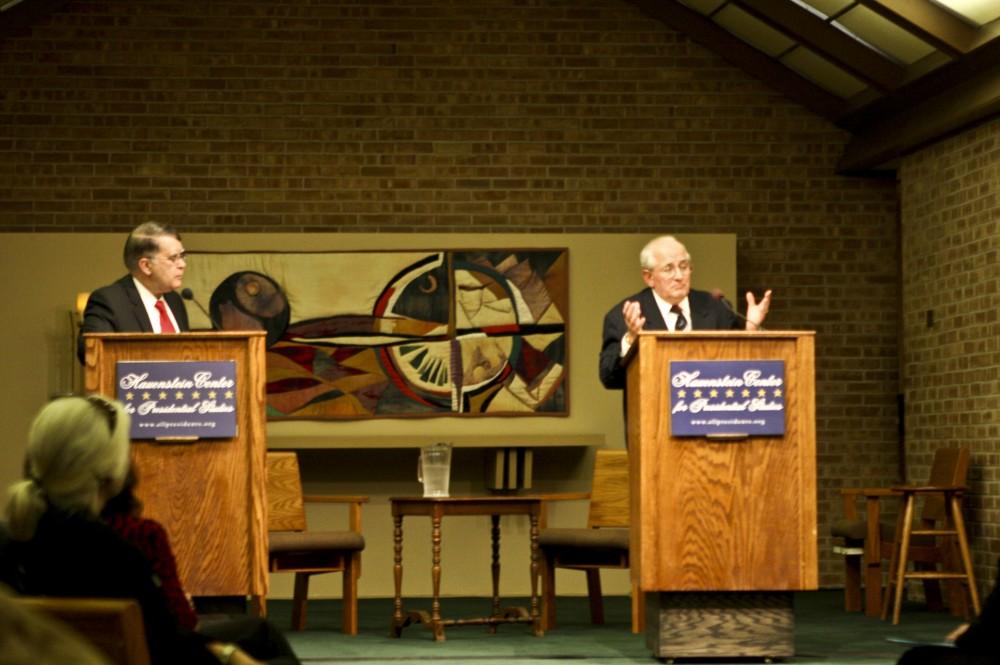Logie, LaBrant debate pros, cons of Michigan ConCon

Debate
Oct 14, 2010
“People prefer a familiar problem to an unfamiliar solution.”
First said by Benjamin Disraeli, a British prime minister in the 1800s, John H. Logie, former mayor of Grand Rapids, applied this statement to current Michigan politics as he debated the question of a constitutional convention with Bob LaBrant.
On Tuesday night the Hauenstien hosted the debate, “Fresh Start: a constitutional convention for Michigan?”
Logie and LaBrant, the Michigan Chamber of Commerce general counsel and senior vice president of political affairs, highlighted the pros and cons of revising the Michigan constitution, all in an effort to familiarize the public with what they deemed to be Michigan’s problems and their suggested solutions.
About 50 people turned out to Fountain Street Church for the public debate. Logie advocated voting yes on Proposal 1 on Nov. 2, which would open the possibility of approving a revised constitution for Michigan. LaBrant opposed the action and supplied reasons why people should vote no on Proposal 1.
Logie’s main argument was that the current constitution is outdated and ill-equipped to address the current challenges facing Michigan. The constitution has been ratified three times before, the most recent being in 1962. Logie said at that time, Michigan relied on a manufacturing-based economy with the auto industry in Detroit and the furniture industry in Grand Rapids. Today, Michigan has developed a service-based economy, which Logie said does not properly fit the current constitution.
Another of Logie’s points was the need to trim the government and give legislators more specific guidelines, which could be done through changes to the constitution. He said Michigan has the second most expensive legislature in the nation, the first being California.
Logie said it will be difficult to pass individual amendments changing Michigan’s policy, which is often recommended as an alternative to a complete constitution revision. The House and Senate must come to a two-thirds consensus on an amendment before voters have the chance to voice their opinion on it. Logie said a revision to the constitution would produce results more quickly and effectively than relying on individual amendments passing through the legislature.
“To expect these underclassmen to do that (put amendments on the ballot) and do it efficiently and timely across a broad range of topics, is to me a little sublime,” Logie said.
LaBrant, however, thinks Michigan citizens should give their new government officials a chance. He said the expectation of a constitutional convention, also known as ConCon, to be the one solution to many problems is “overkill.”
“We have new leadership coming in, and I think they deserve the opportunity to start to try to reboot Michigan’s economy without the activity of a constitutional convention …” he said.
Also, LaBrant warned that the constitutional convention may be an invitation for all special interest groups to try and place their representatives as one of the delegates so their pet projects will be up for debate and possibly addressed in the new version of the constitution.
“Although Michigan has been in the midst of an economic crisis, it’s not a constitutional crisis,” LaBrant said. “There’s nothing in the Michigan constitution that caused the collapse of the auto industry in the state of Michigan … Michigan’s constitution is sound – it contains no fatal flaws.”
He also emphasized that calling for a constitutional convention does not mean the appointed delegates will necessarily change any part of the constitution, and even if they do, voters may not approve of the revision they develop.
Despite the need for a two-thirds majority when making amendments to the constitution, LaBrant said 31 amendments have been added to the Michigan constitution.
“There is flexibility in the document,” he said, but Logie pointed out 37 amendments failed during that same 50-year period.
Members of the audience piped in with questions about what the revision could include, how businesses are expected to react to the proposal and what the effect would be on taxes.
Michigan has the ninth youngest constitution in the U.S. If Proposal 1 passes, the selection of 148 delegates representing each district in Michigan will begin. Work on the constitution revision would probably not start until October 2011. The Senate Fiscal Agency estimates the total cost of the election and revision process at $45 million. Voters would then have the option of approving or rejecting the new version of the constitution.

























